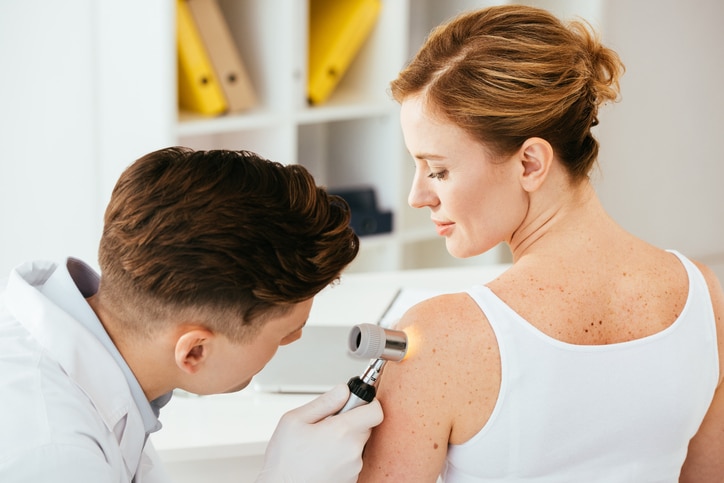
One of the most common cancers diagnosed today is skin cancer. Fortunately, skin cancer can be easily detected as it is one of the few visible cancers that can occur. To ensure safe recover and better health, patients should visit their dermatologist at Harris Dermatology once a year for a skin cancer screening. This screening is a head-to-toe assessment of a patient’s skin and body to look for suspicious lesions that may indicate the presence of skin cancer. However, what does a patient do between screenings if they notice a suspicious lesion?
When should I visit a dermatologist for a suspicious lesion?
Suspicious growths, lesions, or wounds that refuse to heal may be a sign of skin cancer. Because skin cancer is best treated at its earliest stages before it spreads or becomes more severe, patients should contact their dermatologist as soon as they notice these changes. This may be between skin cancer screenings. At Harris Dermatology, we want our patients to be proactive in the care of their skin and body, and we welcome individuals who are concerned about suspicious lesions.
What should I look for in a suspicious lesions?
Skin cancer may present itself in a variety of ways. It may be a wound that does not heal properly. This wound may continually scan and bleed. These lesions should definitely be evaluated by a professional. Additionally, the most serious skin cancer, melanoma, is often present on existing moles. Moles themselves are not cancerous, but if changes begin to occur in their shape, size, color, and borders, this may be a concern.
What to expect during a skin cancer screening
Patients should allow plenty of time for their skin cancer screening appointment with the dermatologists at Harris Dermatology. One of our trained doctors will evaluate the patient’s body for signs of skin cancer. Patients should also bring to attention any suspicious lesions they would like further assessed. If suspicious lesions are found and may be indicative of cancer, the doctor may perform a biopsy. This is the removal of a thin portion of the growth or lesion to send to a laboratory for further evaluation. If skin cancer cells are found, the patient will work with their dermatologist to determine the best course of treatment for their unique situation.
Contact Harris Dermatology today
Patients in the areas of Fort Myers and Naples, FL who have suspicious lesions they want evaluated are welcome to book an appointment with Drs. Brian Harris, H. Ross Harris, and Keith Harris of Harris Dermatology. New and current patients are invited to our practice for comprehensive, quality skin care solutions.

